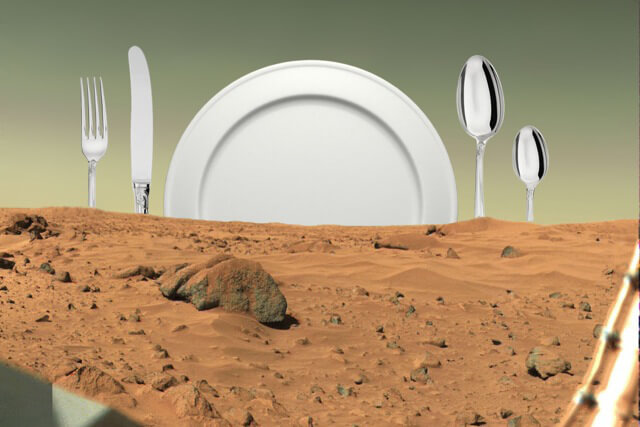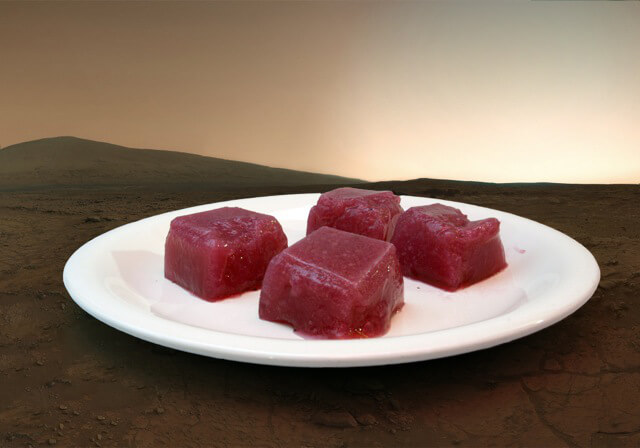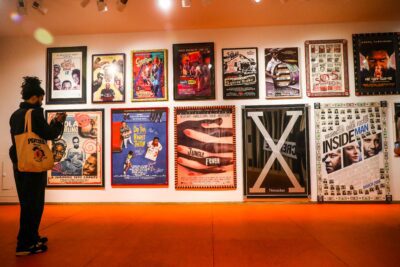Mars Supper Club Pioneers Menu for the Red Planet in Williamsburg


c/o pierogi2000.com
The stuff of science fiction has become reality in our lifetimes: In eleven years, a small crew of humans will embark on a voyage to Mars that will last 1.6 years before they touch down on the Red Planet, already occupied by the robots and rovers that will have been shipped over there a few years prior. One of the first orders of business (after the crew recovers from the effects of feeling gravity again) will be setting up the food production units. There will be greenhouses, sure, but it won’t be as easy as bringing over some seeds and planting them with care. Mars lacks liquid water, has very low atmospheric pressure, less gravity, and the seasons are twice as long—not to mention that it experiences the largest dust storms in the solar system.
Luckily for the future crew, The Menu for Mars Supper Club (a Flux Factory educational initiative organized by Heidi Neilson and Douglas Paulson) has already spent a year researching, prototyping, and taste-testing a menu that is nutritious and sustainable, and considers humans’ cultural relationships to food. On Friday, May 29, their analog Mars kitchen will open to the public at The Boiler in Williamsburg for a month of cooking, workshops, and wacky-sounding but quite serious discussions about everything from cricket-enhanced entrées, to making yogurt from powdered milk, to flavor-altering “miracle fruit.”


There will be jello on Mars c/o pierogi2000.com
“The way we designed this kitchen,” Douglas Paulson explains, “is we imagined that the first people who land on Mars will step out on the planet and, previous to their arrival, a shipment will be sent there for them. That’s why we’re focused on dried or stabilized foods.” The food will thus need to have a very long shelf life of at least three to five years, adds Heidi Neilson, in order to make it to Mars and then last until the first humans arrive a few years later.
The artists, scientists, gardeners, and concerned citizens who took part in the Menu for Mars Supper Club’s monthly dinners at various New York City restaurants looked to tackle problems like these and many more: Which crops will be hardy enough to survive the increased radiation? Will cultural food traditions will the crews transform or will they simply create new ones? And, asks Douglas with a laugh: How do you augment a bag of dried cricket powder and cornmeal with a bag of powdered blue cheese?
“There’s a real interest in this, and the people who have been coming to the supper club meetings have very divergent backgrounds. The scale of participants has grown organically,” he explains. “One of the things that we talk about at every gathering is the cultural aspect of food—not just the ‘how you get the food into a bag and get it to last a long time’ question. We think about how much food is part of our cultural, day-to-day experiences and what ‘togetherness’ means, how we spend holidays. Those things would be very different on Mars.”
If they could hypothetically be one of the first one hundred people who colonize Mars, would they do it? I ask them both. Heidi and Douglas respond almost in unison: No.
“I really like Earth. That’s one thing we’ve come to realize,” says Heidi. “You can go outside here, feel the breeze, and eat any number of fresh foods.”
The Mars kitchen will be open to the public at The Boiler (191 North 14th Street) from May 29th through June 21st. The pantry will be stocked with dried, powdered, thermo-stabilized, and dehydrated Mars-feasible ingredients. Visitors are welcome to try their hand at cooking for Mars (see schedule here).
You might also like 




















